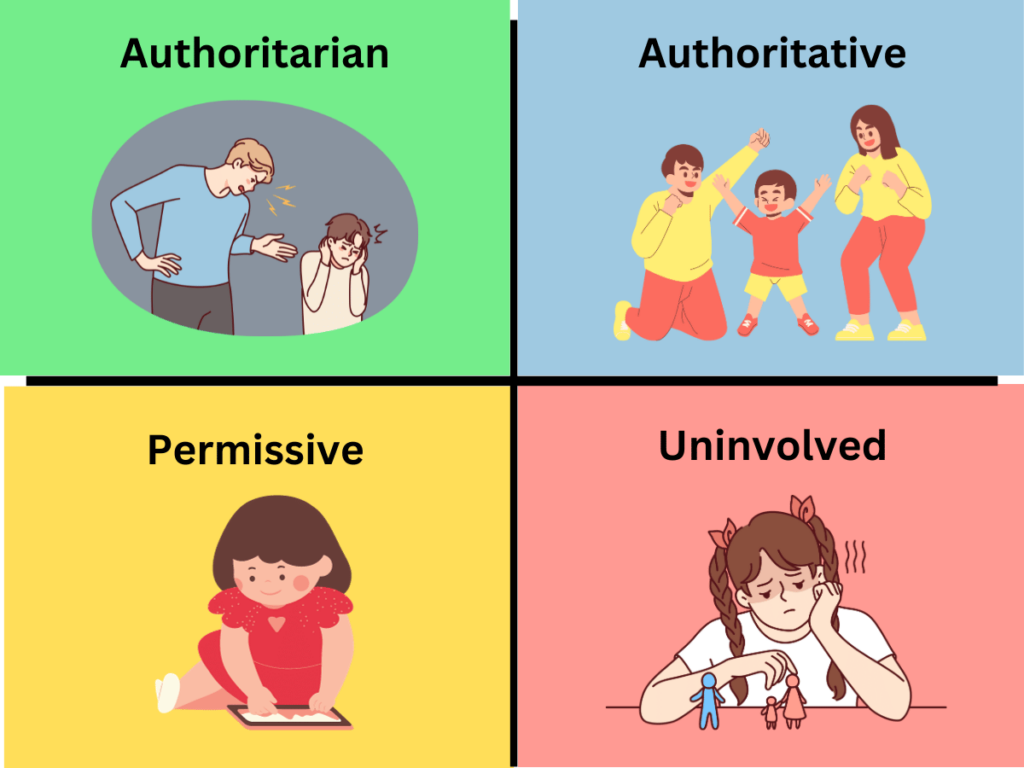
Introduction
Parenting greatly influences children’s growth, particularly those who may need additional support, such as those involved in Applied Behavior Analysis (ABA) therapy. Understanding the different parenting styles can provide insights into how these approaches can impact the effectiveness of therapeutic interventions. This article examines the different parenting philosophies, traits, and approaches that influence the outcomes of ABA therapy.
Understanding Parenting Styles
Four basic categories typically include parenting styles: authoritative, authoritarian, permissive, and neglectful. Each style has distinct approaches and philosophies regarding child-rearing, communication, and discipline. Understanding these styles is particularly important when considering the benefits of early intervention ABA therapy, which can help guide parents in applying effective strategies tailored to their child’s needs.
Domination in Parenting
The hallmark of authoritative parenting is a harmony of responsiveness and demandingness. Parents who adopt this style are nurturing, supportive, and willing to listen to their children while setting clear expectations and boundaries. Research has shown that this style fosters independence and self-regulation in children, making them more likely to respond positively to ABA therapy.
In an ABA context, children raised with authoritative principles might be more open to engaging in constructive behavior change as they are accustomed to receiving consistent feedback from parents. This may enhance the efficacy of therapy sessions and encourage cooperation with therapists.
Authoritarian Parenting
In contrast, authoritarian parenting is defined by high demands and low responsiveness. These parents often enforce strict rules and expect obedience without providing much emotional support. This parenting style may lead to internalization of rules without fostering understanding or reasoning.
Children from authoritarian households may struggle with compliance and may demonstrate anxiety or rebellion, which can hinder the success of ABA interventions. In therapy, these children may be less likely to engage openly or share their feelings, making it difficult for therapists to tailor strategies effectively.
Permissive Parenting
Permissive parents are warm and accepting but place few demands on their children. This style often needs more structure, as these parents may refrain from enforcing rules or consequences. While permissive parenting can foster creativity and free expression, it may hinder a child’s ability to comply with the structured environment of ABA therapy.
Children raised with permissive approaches might struggle with authority figures and expectations set by therapists. This can undermine therapy outcomes, as a lack of boundaries at home may conflict with the structured guidance provided in ABA sessions.
Neglectful Parenting
Careless or detached parenting is typified by a lack of responsiveness to a child’s emotional and physical needs. Children raised in neglectful environments may feel invisible and unsupported, leading to challenges with attachment and trust.
This parenting style can significantly impact outcomes for children receiving ABA therapy. A lack of parental involvement in the therapeutic process can hinder progress, as these children may need to consistently reinforce appropriate behaviors at home, which is critical for success in ABA interventions.
The Interplay of Parenting Styles and ABA Therapy
The interaction between parenting styles and ABA therapy outcomes is complex. Active parental involvement is a cornerstone of effective ABA practice, and the parenting style can shape this involvement in various ways.
The Role of Parental Involvement
Research indicates that positive parental involvement enhances the effectiveness of ABA therapy. Parents who engage actively and constructively with therapists and implement strategies at home can significantly improve their child’s progress. For example, authoritative parents are typically more engaged in therapy sessions and are willing to collaborate with professionals, ensuring that therapeutic techniques are reinforced in the home environment.
On the other hand, permissive and neglectful parents may struggle with consistency, making it challenging for their children to generalize skills learned in therapy to different contexts. This inconsistency can lead to slower progress and potentially increase maladaptive behaviors.
Strategies for Parents
Regardless of their natural parenting style, there are strategies that parents can adopt to enhance the effectiveness of ABA therapy for their children:
- Educate Themselves: Understanding ABA principles can empower parents to reinforce behavioral strategies consistently.
- Emphasize Consistency: Establishing and maintaining routines helps children feel secure and understand expectations, which is crucial for ABA success.
- Communication: Open lines of communication with therapists can help parents implement feedback and effectively support their child’s development.
- Self-Reflection: Parents should assess their parenting styles and remain open to making adjustments that may benefit their child’s therapy.
The Impact of Parenting Styles on Behavioural Outcomes
Understanding the link between parenting styles and behavioral outcomes is essential, especially when considering the efficacy of ABA therapy. Research indicates that children’s emotional and social development is heavily influenced by their parents’ approach. For instance, children from authoritative backgrounds tend to exhibit higher self-esteem and better emotion regulation, which is vital for positive engagement in therapeutic settings. This may result in more notable advancements in behaviors targeted during ABA sessions.
In contrast, the children of authoritarian parents may frequently struggle with self-regulation due to the lack of warm, nurturing relationships. This often results in difficulties in therapy or potential resistance to the changes ABA therapy seeks to implement. Additionally, children from permissive or neglectful backgrounds may need more foundational skills for effective participation in structured environments, as their experience with boundaries and expectations is limited. Therefore, a comprehensive understanding of a child’s home environment and parenting style can provide valuable insights into how best to tailor ABA interventions for success.
Conclusion
In conclusion, recognizing the various parenting styles and their implications on Move Up ABA therapy outcomes can enhance the effectiveness of interventions. Collaboration between parents and therapists and promoting consistent, supportive home environments can significantly increase the potential for positive behavioral changes in children. Engaging in self-reflection and adapting approaches can lead not only to improved therapy success but also to healthier parent-child dynamics overall.


